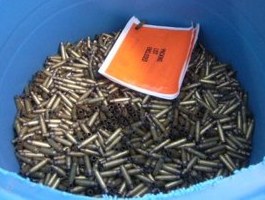![]()
WEAPONS OF CHOICE
Feds undercut civilian supply of ammunition
Policy leaves manufacturers without brass for cartridges
Posted: March 17, 2009
9:00 pm Eastern
By Drew Zahn
© 2009 WorldNetDaily
 Fired brass shell casing |
A recent government policy change has taken a bite out of the nation's already stressed ammunition supply, leaving arms dealers scrambling to find ammo for private gun owners.
Georgia Arms is a company that for the last 15 years has been purchasing fired brass shell casings from the Department of Defense and private government surplus liquidators. The military collects the discarded casings from fired rounds, then sells them through liquidators to companies like Georgia Arms that remanufacture the casings into ammunition for the law enforcement and civilian gun owner communities.
But earlier this month, Georgia Arms received a canceled order, informed by its supplier
that the government now requires fired brass casings be mutilated, in other words, destroyed to a scrap metal state.
The policy change, handed down from the Department of Defense through the Defense Logistics Agency, cuts a supply leg out from underneath ammunition manufacturers.
The policy has compelled Georgia Arms, for example, to cancel all sales of .223 and .308 ammunition, rounds used, respectively, in semi-automatic and deer hunting rifles, until further notice. Sharch Manufacturing, Inc. has announced the same cancellation of its .223 and .308 brass reloading components.
"They just reclassified brass to allow destruction of it, based on what?" Georgia Arms owner Larry Haynie asked WND. "We've been 'going green' for the last dozen years, and brass is one of the most recyclable materials out there. A cartridge case can be used over and over again. And now we're going to destroy it based on what? We don't want the civilian public to have it? It's a government injustice."
As WND reported, firearm sales have spiked since the election of a perceived anti-gun president, and Americans stockpiling bullets have produced a stressed ammunition market.
The Orlando Sentinel reports months of steady, heavy buying have left gun dealers in Florida facing shortages of ammunition.
"The survivalist in all of us comes out," John Ritz, manager of a Florida shooting range, told the Sentinel. "It's more about protecting what you have."
"People are just stockpiling," said a spokeswoman for Georgia Arms, which has seen bullet sales jump 100 percent since the election. "A gun is just like a car. If you can't get gas, you can't use it."
WND contacted the Defense Logistics Agency, the Department of Defense's largest combat support agency, several times seeking comment or explanation for the policy change but received none.
The National Rifle Association confirmed to WND that the DLA had been instructed to require the scrapping of the brass casings but declined further comment at this time.
Other gun advocates, however, have sounded off on the issue, eyeing the change in government policy with suspicion and filling the blogosphere with speculation that the effects of the policy change may be deliberate.
"It is an end-run around Congress. They don't need to try to ban guns – they don't need to fight a massive battle to attempt gun registration, or limit 'assault' weapon sales," writes firearm instructor and author Gordon Hutchinson on his The Shootist blog. "Nope. All they have to do is limit the amount of ammunition available to the civilian market, and when bullets dry up, guns will be useless."
A writer named Owen at the Boots & Sabers blog suspects the policy change is an effort by an anti-gun administration to raise the cost of ammunition.
"This policy didn't come out of the blue," writes Owen. "The Commander in Chief is clearly sending a message to gun owners that they should be paying more for ammunition. If he can't do it through regulatory action, he'll do it by forcing ammunition manufacturers to spend more on production."
Hutchinson reports Georgia Arms was manufacturing over 1 million rounds of
.223 ammunition every month, but without the ability to purchase expended
military ammunition, the company may be forced to lay off up to half its
workforce.